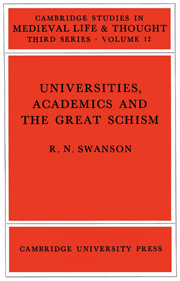Book contents
- Frontmatter
- Contents
- Maps
- Preface
- Abbreviations
- 1 The rival obediences, 1378–1409
- 2 The rival obediences, 1409–1418
- 3 The universities of Europe, 1378–1418
- Introduction
- 1 THE CONTEXT
- 2 A MATTER OF LOYALTY
- 3 DE SCHISMATE EXTINGUENDO
- 4 A BREATHING SPACE
- 5 DE SUBTRACTIONE OBEDIENTIE I
- 6 DE SUBTRACTIONE OBEDIENTIE II
- 7 DE RESTITUTIONE OBEDIENTIE
- 8 DE MATERIA CONCILII GENERALIS
- 9 HAEC SANCTA SYNODUS …
- 10 CONCLUSION
- APPENDIX 1 Notes on some academic personalities
- APPENDIX 2 University foundations, 1378–1418
- Notes on manuscripts cited
- Bibliography of works cited
- Index
8 - DE MATERIA CONCILII GENERALIS
Published online by Cambridge University Press: 27 October 2009
- Frontmatter
- Contents
- Maps
- Preface
- Abbreviations
- 1 The rival obediences, 1378–1409
- 2 The rival obediences, 1409–1418
- 3 The universities of Europe, 1378–1418
- Introduction
- 1 THE CONTEXT
- 2 A MATTER OF LOYALTY
- 3 DE SCHISMATE EXTINGUENDO
- 4 A BREATHING SPACE
- 5 DE SUBTRACTIONE OBEDIENTIE I
- 6 DE SUBTRACTIONE OBEDIENTIE II
- 7 DE RESTITUTIONE OBEDIENTIE
- 8 DE MATERIA CONCILII GENERALIS
- 9 HAEC SANCTA SYNODUS …
- 10 CONCLUSION
- APPENDIX 1 Notes on some academic personalities
- APPENDIX 2 University foundations, 1378–1418
- Notes on manuscripts cited
- Bibliography of works cited
- Index
Summary
The reaction within France to the restoration of obedience to Benedict XIII is best epitomised in the euphoria of Jean Gerson's sermons Emilte spiritum tuum and Benedic haereditate tuae. But the euphoria was all too soon dissipated, to be succeeded by disillusionment born of the realisation that the reunion of the church remained but a distant prospect. The restitution of obedience meanwhile produced its own difficulties: the French treated it as conditional, whereas Benedict considered it to be a complete vindication of his papalism. These conflicting attitudes were bound to clash; by January 1404 Gerson's earlier eulogies had become transformed into the animosity of his sermon Apparuit gratia Dei, preached before the pope himself at Tarascon.
Meanwhile, both obediences remained steadfast in their loyalties. France and Spain, although once again recognising Benedict XIII, continued to urge implementation of the via cessionis. Benedict himself seems to have aspired to expand his obedience – attempts were made to gain the adherence of Florence in 1405, while the Welsh revolt under Owain Glyndŵr was fully exploited. On the other hand, the Romanist universities continued to send rotuli to their successive popes, Boniface IX, Innocent VII and Gregory XII. A minority of Romanists continued to exist at Paris, even during the reign of Gregory XII, and there are signs that similar groups remained in the provincial universities.
- Type
- Chapter
- Information
- Universities, Academics and the Great Schism , pp. 148 - 174Publisher: Cambridge University PressPrint publication year: 1979



